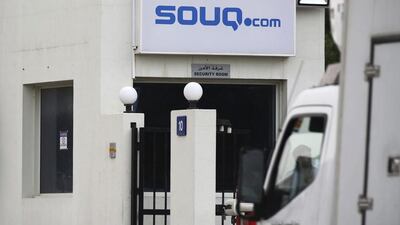But opportunities for property players to cash in on the trend are proving elusive
The growth in activity in e-commerce is creating investment opportunities in the UAE’s industrial property market, but only for a handful of developers, according to experts.
David Godchaux, the chief executive of Dubai-based Core Savills, said that “demand from e-commerce-type businesses has certainly increased”, but since operators in this space tend to require specialist facilities which are not currently available in the market, there is an opportunity to build for them.
“Industrial is typically left behind by most private investors in favour of offices and residential, because it’s just easier to understand. It’s less attractive for psychological reasons if nothing else,” said Mr Godchaux.
“Institutional investors are, of course, actively looking at this market because although properties available for investment remain limited in this country, you have a potential return there that is much higher than offices, retail or residential for risk that is possibly lower.”
However, opportunities for investors to buy in this market remain few and far between – mainly because the space isn’t available to buy. There is a general lack of Grade A space in the market, so occupiers often have to get it built for them by a developer, who secures a long lease and then retains the unit.
“Why would they go and sell to investors? They build to keep because it’s a very nice return,” said Mr Godchaux.
Matthew Green, the UAE head of research and consultancy at CBRE, said that there are “a number of big parties” in e-commerce that have looked for logistics space then realised that they need to build their own.
“Ultimately, someone like an Ikea or an Amazon are going to have a certain level of spec and quality which won’t be available in this market,” he said.
Mr Godchaux argued that the few investment opportunities that come to market are units that tenants pay to build and then complete sale-and-leaseback deals. He said that he expects to see more of these transactions as the market matures.
Last month, Rasmala bought 48 warehouses in Dubai Investments Park for US$68 million, adding to the 72 units in the same area it bought for $81m in August last year. In March, Bahrain-based Arcapita paid $150m for “income-generating logistics assets” in Dubai, which included 1.2 million square feet of space in 10 warehouses in Dubai Investments Park, plus eight warehouses in Al Quoz. The firm said that it was also “utilising its sector knowledge to acquire assets that are located in proximity to Al Maktoum International Airport, Expo 2020 site, and Dubai’s major transport and logistics arteries”.
Mr Green argues that Dubai South – the master-planned site that includes the airport, the Expo site and a 21 sq kilometre logistics district – is a natural location for e-commerce firms.
“It has the bonded connection, it is close to the port and is close to the airport that will have the biggest capacity in the future for cargo and for passengers,” he said.
“It’s quite easy and quick to get to that from the port, and then you can connect from any one of several arterial routes into Dubai or the wider UAE from there. And it’s comparatively new, so there is lots of land availability and you are more likely to find land at a rate that is attractive.”
Andrew Love, a partner and head of investment and commercial agency at Dubai-based Cavendish Maxwell, said that custom-bonded free zones like Dubai South and Jafza are well-suited to occupiers who specialise in the import and export of goods outside the GCC, because they benefit from duty exemption. However, if a firm plans to move goods into the UAE, it pays a 5 per cent duty and a consignment charge. As a result, many prefer to move goods onshore, where deliveries are easier and where the administrative burden of receiving returns is less troublesome.
“Today, we generally see retailers have both onshore and offshore facilities. They tend to stockpile goods at a large, out- of-town facility, which may be offshore (sometimes referred to as e-fulfilment centres) and then hold sufficient quantities of smaller, popular items at urban logistics hubs which allow for direct delivery to the consumer.”
Moreover, both Souq.com and logistics operator Aramex have recently opened smaller retail units on Sheikh Zayed Road, as well as drop boxes and collection points at petrol stations.
Yet Mr Love said that although the e-commerce industry is “growing considerably” in Dubai, its impact on the logistics market is currently fairly limited. There are only a few major players who need their own space, he said, while many of the firms now entering the market are already owners of big retail franchises with their own supply chains. Many smaller players also tend to outsource logistics to firms with established facilities.
“As a result we have not yet seen the growth of e-commerce have any major impact on the overall warehouse market,” he said.
He said that of all the logistics space taken up over the past two years, less than 25 per cent has gone to e-commerce firms.
“The biggest move was Noon, who rented a facility in excess of 150,000 sq ft at Dubai South,” said Mr Love.
“We do see rental requirements from smaller e-tailers from time to time, but these tend to be small and easier to place.”
mfahy@thenational.ae


